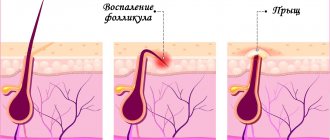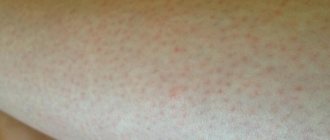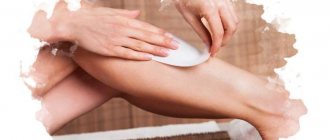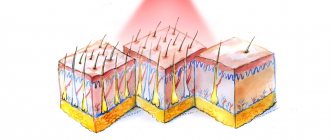Causes of irritation in the bikini area
- External factors
Irritation in the bikini area is often caused by mechanical damage to the skin. After shaving the intimate area, redness, pimples, and itching often appear - the skin becomes especially inflamed in the summer, when sweating increases. When depilating with a razor, the top layer of skin is damaged, which can lead to dryness and flaking, and growing short hairs cause itching and, accordingly, redness and scratches on the skin.
Expert opinion
Depilation using wax, sugar paste and tweezers damages the top layer of skin to a lesser extent, but more often provokes ingrown hairs. As a result, painful pimples form in the bikini area, the opening of which is fraught with the penetration of pathogenic agents into the deeper layers of the skin (especially in the hot season).
Obstetrician-gynecologist of the highest category Oksana Anatolyevna Gartleb
Violation of the temperature regime that is comfortable for the skin - too high or, conversely, low temperature - can also cause discomfort in the vagina. Of course, external contamination of delicate areas may not be the last cause of irritation.
In addition, discomfort may occur from inappropriate intimate cosmetics. For example, hypoallergenic baby soap, which many women still use as an intimate care product, greatly dries out the delicate skin of the vagina, since the production of sebum by baby skin and the delicate skin of the intimate area occurs in different volumes. It is important to use special products for intimate hygiene - for example, GINOCOMFORT Soothing washing gel consists of natural ingredients that not only delicately cleanse the vaginal mucosa and skin of the labia, but also regulate the acid-base balance that is comfortable for this area.
- Microflora disturbance
One of the most common causes of severe irritation in the intimate area is diseases associated with disruption of the natural bacterial and acid-base balance: thrush (candidiasis), bacterial vaginosis (dysbacteriosis).
These diseases can be caused by a general decrease in immunity, poor diet, sleep, hygiene, frequent stress, taking antibiotics, promiscuity, etc.
Characteristic symptoms include severe irritation in the intimate area after sex, thick atypical discharge with a pronounced unpleasant odor, severe itching and burning. Any of these diseases is treated with special regimens using antibacterial drugs, pro and prebiotics. Self-medication can cause irreversible complications or make the process critical, so it is better to contact an obstetrician-gynecologist to clarify the diagnosis and develop treatment tactics.
- Allergic reactions
Often, intimate itching can occur with contact dermatitis - a manifestation of allergies in a delicate area. One of the most common reasons is scented hygiene products. Fragrance in pads, tampons, and toilet paper is a strong allergen and can cause itching. If you experience irritation in your intimate area, especially during menstruation, try changing your pads - this may solve your problem. In some cases, allergies can be caused by contraception (latex condoms) and lubricants. Most condoms are made from latex.
- Hormonal background
Irritation in the intimate area in women often occurs before hormonal changes: menstruation, pregnancy. Many women are familiar with the sensation of dryness, burning, and severe itching. Irritation in the perineum can be an external sign of hormonal disorders such as hypo- or hyperfunction of the thyroid gland, ovaries, and adrenal glands. To establish an accurate diagnosis, a consultation with an obstetrician-gynecologist and tests for hormone levels are necessary.
Expert opinion
Changes in hormonal levels and the resulting irritation in the intimate area can be triggered by taking oral contraceptives. This situation is especially common if a woman takes OCs, chosen independently or on the advice of a friend, without consulting a gynecologist.
Obstetrician-gynecologist of the highest category Oksana Anatolyevna Gartleb
- Poor intimate hygiene
It is obvious that irregular showering, especially during menstruation, hot weather or after visiting the gym, leads to an increased proliferation of harmful bacteria and fungi, causing rashes and itching in the intimate area in women. Wearing synthetic underwear also has a negative effect - panties made of artificial fabrics do not allow air to pass through, creating a greenhouse effect - an ideal environment for the proliferation of pathogenic microbes. It is important to know that thongs, thongs and similar models are a “bridge” for bacteria from the anus, so if discomfort occurs, it is better to refrain from wearing them.
- Diseases of internal organs
Endocrinologists warn: severe itching and dryness in the genital area is one of the indirect signs of diabetes. Sometimes irritation in the intimate area can indicate anemia, leukemia, immunodeficiency conditions, inflammation in the urinary system, gastrointestinal tract, and cancer. Redness, spots and rashes on the external genitalia occur with eczema (eczematis) and psoriasis (psoriasis).
Of course, you can’t rely only on vaginal itching to make an accurate diagnosis, but this unpleasant symptom can indicate serious health problems, so it’s better not to delay visiting a specialist.
- Sexual infections
Itching, burning and unpleasant discharge after sexual intercourse (especially unprotected with a new man) are accompanying sexually transmitted diseases. They are especially characteristic of gonorrhea (Gonorrhoea), chlamydia and trichomoniasis (trichomoniasis). In addition to discomfort in the intimate area, sharp pain during urination, pain during sexual intercourse and foul-smelling discharge may be added - if these signs appear, you should urgently get tested and visit an obstetrician-gynecologist. Most sexually transmitted infections in the early stages can be quickly and successfully treated, so timely consultation with a doctor can save you from unpleasant consequences and complications.
- Stress
The female genital organs are very susceptible to psychological conditions: emotional instability, stress and frequent anxiety can cause itching in intimate places.
It is important to monitor your stress levels whenever possible and use sedative therapy if necessary to improve your quality of life.
The causes of irritation in intimate areas are varied and may depend on completely different factors. If you feel that self-treatment does not lead to an improvement in the situation, do not hesitate to visit an obstetrician-gynecologist, this way you will quickly determine the cause of the discomfort and get rid of it.
The causes of irritation in intimate areas are varied and may depend on completely different factors. If you feel that home treatment does not lead to an improvement in the situation, do not hesitate to visit a gynecologist, this way you will quickly determine the cause of the discomfort and get rid of it.
Itches after depilation what to do
To prevent your skin from itching after depilation, you need to follow simple rules before and after the procedure:
- light scrubbing of the dermis: for girls with sensitive skin, it is better to carry out the procedure immediately before epilation. Others can do it the day before going to the cosmetologist. For scrubbing, it is better to use natural products: coffee, honey, cinnamon, ground peanuts, etc. This will reduce the risk of allergic reactions;
- steaming the skin: a hot shower will help. Warm water helps open pores, hair follicles pass through easier and faster;
- treating the skin with antiseptic agents: this can be Miramistin, hydrogen peroxide, Chlorhexidine. The use of alcohol-containing products is not advisable;
- anesthesia: when performing photo or laser hair removal, a cosmetologist can apply a lidocaine-based cream to the dermis.
During epilation, the upper layer of the dermis is injured, so the skin needs special care after epilation. Moisturizers are actively used.
Sources:
- https://olacenters.com/info/kosmetologiya/razdrazhenie-posle-epilyatsii/
- https://solnysh.ru/deti/razdrazhenie-posle-depilyacii-voskom-chto-delat-posle-depilyacii—.html
- https://femalegs.ru/zabota-i-uxod/depilyaciya-nog/problemy-posle-epilyacii-nog.html#Pochemu-cheshutsya-nogi-posle-protsedury
- https://podruge.ru/blog/irritation-bikini-after-epilation/
How to get rid of skin irritation in the intimate area?
Of course, only an obstetrician-gynecologist can determine the exact treatment regimen depending on the cause of discomfort. We will tell you about the main methods of relieving itching and burning in intimate areas. In cases associated with diseases of the reproductive organs and other internal diseases, when discomfort in the vagina is a concomitant symptom, complex drug therapy is used to eliminate the underlying cause. It is prescribed individually depending on the underlying disease. In case of endocrine disorders, treatment is carried out using systemic and local hormonal drugs.
Burning and itching due to disturbances in the acid-base balance and microflora are removed with antibacterial or antiseptic drugs, pro and prebiotics, and lactic acid. Treatment often lasts only a few days.
If the discomfort is mild and does not require serious treatment, daily washing with infusions of calendula, arnica, chamomile and other medicinal plants with a calming and disinfecting effect can help.
In the process of eliminating unpleasant sensations in the vagina, it would not be superfluous to enhance the effect of drug treatment from the outside with the help of specialized intimate cosmetics. Soothing washing gel GINOCOMFORT normalizes microflora, gently cleanses the skin and gives a feeling of freshness throughout the day.
How to properly shave the intimate area for women? Source – Ksyu Myakonkaya – Beauty Ksu
Pimples and irritation after shaving in the intimate area in women: how to properly remove hair with a razor?
Hair removal in intimate areas is a recent trend. How to avoid irritation after depilation?
- Be sure to apply shaving cream or foam to your skin before depilation.
- If you are removing hair with a reusable machine, treat it with a disinfectant such as alcohol or chlorhexidine.
- Use only a very sharp razor; a dull razor can damage delicate skin.
- Do not press the razor too tightly against the skin or run over one area several times in a row.
- After depilation, treat the skin with a septic cream and do not wear underwear until it dries to allow the area to calm down and not cause irritation.
1.General information
Itching is an extremely unpleasant skin reaction; if it “itches”, it is impossible to concentrate on something else, it is impossible to be distracted, to hide, to work, to take a forced position, to wait, to sleep. Only with the utmost effort of will can you restrain the persistent movement of your fingers in the direction of the itchy area, and sometimes this fails, and then the “combed” area itches even more, and you have to again...
The problem is greatly aggravated if the skin itches - and itches unbearably - in a place that cannot be declassified under any circumstances in the presence of other people. For example, in the perineum. And all that remains is to feign deep attention to the words of the interlocutor, but in reality make imperceptible movements on the chair, or shift from foot to foot, or sneak a glance at the watch: this torture must someday end.
Itching in the perineum, in principle, cannot be “normal,” “common,” or unimportant. This is a desperate attempt by the body to attract attention to the problem. Whatever the reasons (and there is no such thing as causeless itching), they are always pathological and always require a response, and the most appropriate response in this case is to see a doctor.
A must read! Help with treatment and hospitalization!
Cream or soap: how to properly care for the skin in intimate places?
- Use only special cosmetics for delicate intimate care. It contains natural ingredients, does not cause allergic reactions and is suitable for gentle cleansing of delicate areas. The composition of GINOCOMFORT washing gels corresponds to modern recommendations of gynecologists - GINOCOMFORT intimate cosmetics are not only suitable for daily care, but also help to maintain the cleanliness of the genitals during menstruation and during the treatment of gynecological diseases, when the body is especially vulnerable.
- If possible, wear comfortable underwear made from natural fabrics. If you want to wear erotic panties, be sure to take a shower before putting on such panties, and also change your underwear before going to bed - sleeping in thongs can increase the level of pathogenic bacteria in the vagina.
- Maintain personal hygiene: obstetricians-gynecologists recommend washing yourself 1-2 times a day, during menstruation up to 4 times a day, if possible, with each pad change.
Pads and tampons should be changed every 3-4 hours, regardless of the amount of discharge. - Pay attention to contraception: if you are allergic to latex, choose condoms made from other materials.
- Visit your obstetrician-gynecologist at least 2 times a year to rule out the development of diseases.
And remember: irritation in the intimate area, even if it just “itches” and there are no other more serious symptoms, is not the norm, and this condition is most often easy to eliminate.
There is no need to avoid the possibility of solving an unpleasant problem. The right cosmetics and treatment selected by an obstetrician-gynecologist will allow you to regain confidence in your beauty, comfort, feeling of freshness and good mood every day. Sources:
- Inflammatory diseases of the female genital organs. Modern perinatal technologies in strengthening the reproductive health of patients. Naumov I.A. // Monograph. Saarbrucken: LAP LAMBERT Academic Publishing GmbH end Co. KG. — 2011. — pp. 18–21.
- Microbiological characteristics of biotopes of the reproductive tract with endometritis. Glukhova E.V., Shakhovskaya I.N. // Togliatti honey. consultation – 2008. – 1 (2): pp. 38–44.
- Medical and social characteristics and forecasting of reproductive health of young women at the present stage. Torubarov S.F. // Social aspects of public health. – 2013. – 5 (33): P. 7.
- https://ciplamed.com/content/important-tips-to-maintain-intimate-hygiene
- https://www.lactacyd.eu/your-intimate-zone/
- https://www.medicalnewstoday.com/articles/321537.php
Popular questions
Irritation on the pubic area under the hair.
What to do? You need to understand what caused this: an allergic reaction, a bacterial, fungal or viral infection, or an injury during depilation. For this, a consultation with an obstetrician-gynecologist, and in some cases a dermatologist, is required. Only then will it be possible to recommend suitable treatment.
Severe itching on the labia, irritation. There is nothing to worry about in the vagina itself. What could it be?
This may result in an allergic reaction or inflammation. I recommend using Ginocomfort gel with mallow extract, applying it once a day to the discomfort zone for 7 days. If you do not notice relief, consult a doctor.
I am 69 years old. I am concerned about vaginal irritation and dryness. I was treated once with Triozhinal suppositories. The result was positive for 1.5 years. Now this problem has arisen again. But now these candles cause a strong burning sensation. Today I am flying to the sea, and I am afraid that I will not be able to swim, since the salt water is making the problem worse. Please advise what I can do. Thank you! Hello! During the postmenopausal period, inflammatory processes develop in the genital tract against the background of atrophic changes in the mucosa caused by hormone deficiency. Its layers become thinner, elasticity decreases, and the number of lactobacilli decreases. In this situation, a study is required: a smear for flora, oncocytology. The first step is to prescribe drugs with anti-inflammatory activity, and the second step is to moisturize, restore microflora, and, in the absence of contraindications, local hormone-containing suppositories. A feature of treatment in this age group is continuous maintenance therapy. At this stage, before receiving the results of the study, you can use Ginocomfort gel with mallow extract, which will have anti-inflammatory and moisturizing effects. The gel is applied in 1 dose 1 time per day for 10-14 days.
Hello! Is it possible to feel a burning sensation and irritation when using Gynocomfort?
Hello!
A slight tingling sensation may be felt immediately after administration, but will quickly subside on its own. If this happens, then you should continue to use the gel. For an accurate diagnosis, contact a specialist
Legs itch after waxing
Some women experience severe itching after epilating their legs. In most cases, this is due to skin damage and natural regeneration. The second common cause of itching after epilation of the legs is contact dermatitis.
In addition, repeated application of a hot waxing or sugaring mixture to the same area contributes to the development of contact dermatitis. The third reason for itchy legs after hair removal is natural hair growth. This itching appears 2-7 days after removal and is associated with the germination of the rod through the layers of the skin. The tip of the new hair irritates the nerve endings as it passes through the epidermis, which causes the desire to scratch.
After any hair removal, slight local irritation appears, which goes away after 1-2 hours without the use of any products. This is due to a violation of the integrity of the skin, but, as a rule, the period of complete healing does not exceed 1 day.
After depilation, your legs itch due to increased skin sensitivity; due to mechanical friction immediately after the procedure; due to an allergy to the components of the mixtures used for hair removal.










